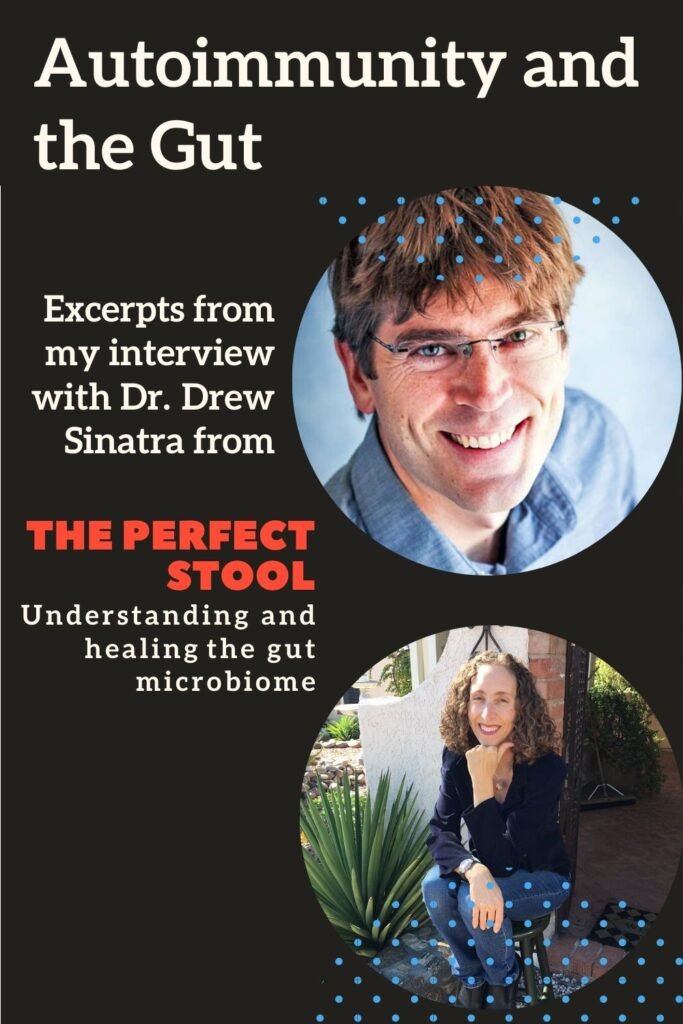
From my podcast interview with Dr. Drew Sinatra, edited for readability.
What is the relationship between the gut and autoimmunity?
There are three things that I tend to look for. First you need to have a genetic predisposition. So, for example, with celiac disease, you must have either one or two of the HLA-DQ2 or HLA-DQ8 genes. Number two would be there has to be an exposure to an environmental trigger that will instigate an immune response. And gluten is a classic example of that. That’s the trigger that creates all this inflammation. And then, thirdly, there has to be intestinal hyper-permeability in the intestinal lining, which will obviously allow substances to go from the gut lumen into the bloodstream, and the immune system will become activated and that will set off a sort of systemic inflammatory type reaction. So, generally speaking, that’s kind of how I look at the development of autoimmune diseases.
And also you can use those three parameters for treatment as well. If you want to remove the trigger, which today we’ll talk about some triggers for autoimmunity in the gut. And what I found, doing a lot of research into this is that, unfortunately, there’s no unified theme when it comes to certain bacteria or certain phyla that might be increased or decreased, or looking at byproducts like short chain fatty acids, whether those are increased or decreased. It seems like there’s huge variability all across the board. Let’s say a condition like rheumatoid arthritis might have an elevation in prevotella, but in MS, you might have a decrease in prevotella species. So, I was hoping for more of a concrete unifying theme around these parameters, but I didn’t necessarily find it. And so that’s why I still come back to treating those three parameters in terms of development of autoimmune disease and also using them as treatment.
And so how important do you think gluten is for most autoimmune conditions?
I’m so happy you asked that. I take every single autoimmune patient that I see off gluten, and the reason I do that is because I’m sure you’ve read up on a lot of Alessio Fasano’s work in regards to zonulin. But gluten is one compound that can elevate and increase the production of zonulin, which then leads to the disassembly of tight junctions, which therefore sets the stage for leaky gut. And that happens regardless if you have celiac disease or if you have non-celiac gluten sensitivity or if you don’t even have any sensitivity or allergy to gluten. It happens in everyone. There’s this increase in zonulin that’s temporary after consuming gluten. You need to have the intestinal hyper-permeability present for autoimmune disease. That’s why I always take every single patient off of gluten that has an autoimmune condition. And I will say this too, out of all the treatments I’ve done over the last 12 years in private practice—this is including supplements, medications, dietary changes—gluten removal has been the most profound in terms of changes. . .
We talked about the diet piece, the autoimmune paleo, or anti-inflammatory diets – where I like to start. I always add on vitamin D if there’s overarching inflammation in the body. I’ll typically do like a tumeric or a boswellia or an artemisinin supplement to calm down inflammation.
I’m a huge fan of CBD. I don’t know if you’ve dug into CBD at all, but big fan of CBD . . . And you know what you’ve got to do is really talk to the company and figure out what they’re doing that is special, and make sure that their products are organic and they’re not overly processed. And then you need to experiment on yourself to figure out which one actually helps you feel different or better. That’s how we settled on it. I finally settled on one, it’s called Sana Botanicals. I love that company. They have such amazing products that work well, and I tell you, people come back and they’re sleeping better, they have less anxiety, they feel just calmer in their body, and it also helps with pain and inflammation.
. . . And then I also like to recommend LDN, low dose naltrexone. And it’s never good as a monotherapy, but when you combine it with everything that we’re talking about today, I do find it’s helpful across the board for autoimmune conditions. And the reason for that is it’s really helping upregulate T regulatory cells, which can really calm down a part of your immune system that’s overactive. And side effect profile-wise . . . people might have some insomnia the first couple of nights or some vivid dreams, but then that tends to go away, especially if you start off with a low dose and work them up.
I like, obviously probiotics, which you talked about, prebiotics getting mainly from food are really going to support the gut lining and work on inflammation. And then something like a GI Revive or something that has glutamine in it or DGL or aloe or marshmallow root, slippery elm, zinc carnosine, all these different nutrients to help calm down inflammation and help heal the gut.
If you want more help with your gut, autoimmune or other health issues, you can set up a free, 30-minute Breakthrough Session with me (Lindsey) to share what you’ve been going through and decide whether my 5-appointment gut health coaching program or a longer program for autoimmunity or weight loss is a good fit for you. Individual 1-hour consultations may be scheduled directly here.


